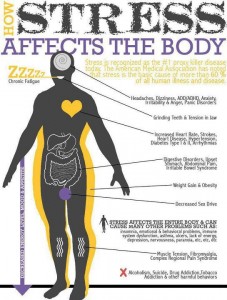 As I concluded in the last post the way to deal with stress is not just to mask the symptoms and sweep them under the carpet! That would be foolish and naive, analogous to removing the battery from a smoke alarm. The alarm is there as a warning. Ignore it and the likelihood of your house burning down increases! As we have discussed there are 2 reasons for a symptom either it is part of the cure OR it is a warning! And if a warning light goes on in your car you would check it out! Well your body deserves the same attention! So rather than hiding the symptoms here are 7 simple ways to help your body adapt and cope better!
As I concluded in the last post the way to deal with stress is not just to mask the symptoms and sweep them under the carpet! That would be foolish and naive, analogous to removing the battery from a smoke alarm. The alarm is there as a warning. Ignore it and the likelihood of your house burning down increases! As we have discussed there are 2 reasons for a symptom either it is part of the cure OR it is a warning! And if a warning light goes on in your car you would check it out! Well your body deserves the same attention! So rather than hiding the symptoms here are 7 simple ways to help your body adapt and cope better!
1. Remove stimulants from your diet and lifestyle – alcohol, sugar, grains, caffeine, cigarettes etc. Your body is under enough stress without needlessly contributing to it!
2. Exercise or even just move more. A recent study that followed 40,000 post-menopausal women for seven years found that those who regularly engaged in moderate activities had a 41 percent lower death rate than those who did not exercise. California State University also found that only a 10-minute walk is enough to increase energy, alter mood, and effect a positive outlook for up to 2 hours.
3. Have more fun and laugh more. We need to stop taking life so damn seriously! By the time a child reaches nursery school, he or she will laugh about 300 times a day, while adults only laugh an average of 17 times a day.
4. Get more sleep … just not too much! We need between 7 to 8 ½ hours sleep a night, less than that and your risk of developing breast cancer increases by 200% and your risk of developing heart disease increases by 100%! However any more than 9 ½ hours sleep and you may unwittingly be at risk from a plethora of health problems. Now to try and get a good nights sleep follow these simple tips: Try to go to bed and wake up at the same time each day; Set your bedroom’s temperature at a comfortable level being neither too cold nor too hot; Do not have your last meal of the day too close to your bedtime – not less than two hours before you go to bed; As bedtime approaches, physically and mentally slow down; Have a warm bath and listen to some soothing music; Clear your mind of stressful and worrying thoughts; a lot of people have found keeping a diary helps with this and switch off your computers and tvs!
5. Relax and unhook! Most of us spend so much time chasing our tails racing from thing to thing that we don’t give adequate time to simply absorbing it all. So try and reflect and relax a little! This can be activities such as prayer, meditation, singing or even cooking really anything that helps get you out of your head and into the moment. This is vital to helping you manage the stress of constant stimuli and energy demands. “Think positive” is nice advice, but it’s tough to do if you are at your limit. It’s easier to find an action that naturally lends itself to positive thinking and feeling, rather than trying to control your thoughts. That in and of itself can become stressful. So find an immersing action that works for you and do it religiously.
6) Drink more water – Our bodies, including our brains, need water to function properly. If you’re just a bit dehydrated, your body’s levels of cortisol, a stress hormone, increases. Plus, stress causes a loss of fluids because it pushes up the heart rate and causes us to breathe heavier! Now sadly that doesn’t mean that drinking plenty of water throughout the day will magically cause your money problems, your kids’ troubles at school, and your deadlines at work to disappear. But if you’re already stressed by coping with all of these things, you don’t need the additional stress of dehydration to add to your burden.
7) Get your spine checked by a chiropractor. As we mentioned in the last section and in fact in lots of our previous posts health depends on function and function is controlled by your nervous system. So if your body is going to cope or adapt to the stresses you face you need your nervous system to be functioning at its optimum. One of the effects of chronic stress is prolonged muscle tension and contraction which can create uneven pressures on the bony structures of the body, often leading to the misalignment of the spinal column, known as subluxations. These subluxations can then cause nerve irritation which can lead to common conditions such as back and neck pain, headaches, and even high blood pressure. Chiropractic adjustments correct these misalignments thereby reducing spinal nerve irritation, improving circulation and releasing muscle tension. These changes whilst not removing the source of stress will certainly help to slow down or stop the fight or flight response. So our seventh tip is that a healthy and balanced spine is key to effectively managing stress.
